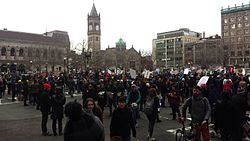United States





From January 28 through February 4, 2017, a large number of protests at international airports and other locations were held across the United States and abroad, in opposition to Donald Trump's Executive Order 13769, known as Protecting the Nation from Foreign Terrorist Entry into the United States.





Activists gather at the US Capitol to protest President Donald Trump's executive actions on immigration in Washington January 29, 2017.